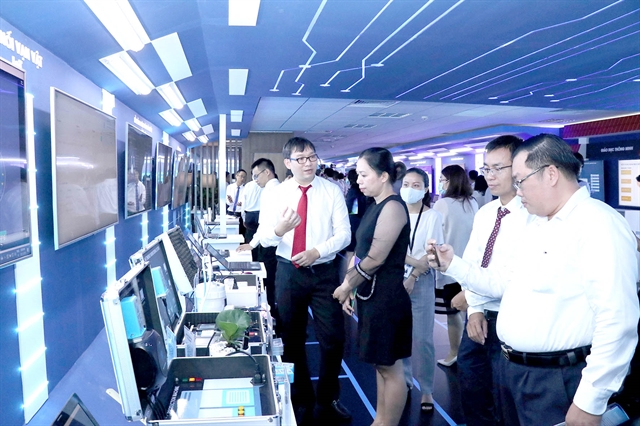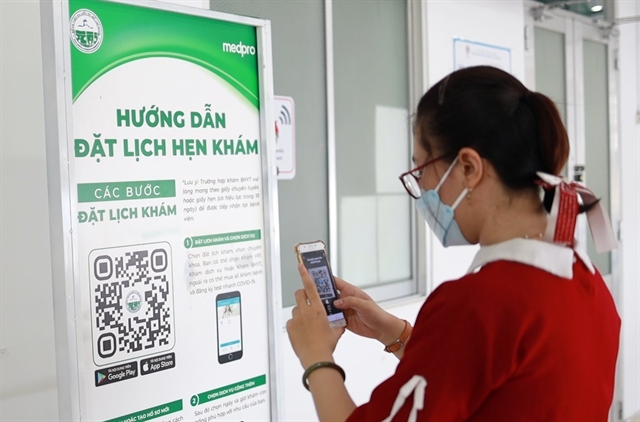 Society
Society


|
| People and businesses visit HCM City for innovation and to experience sharing digital transformation. — VNA/VNS Photo Xuân Khu |
HCM CITY — Võ Thị Trung Trinh, deputy director of the HCM City Department of Information and Communication, said the city has concentrated on establishing digital data to share, exploit, and analyse on its way of becoming a digital economy, society, and government, and smart city by 2030.
The city is one of the five leading localities in the country for digital transformation, with most administrative procedures available for use online.
The rate of administrative documents handled online has reached 60 per cent. The minimum percentage of online administrative documents successfully processed online at the municipal, district and ward levels are 50 per cent, 40 per cent, and 35 per cent, respectively.
Trinh said that digital transformation and data management is a long-term project that needs adjustment from time to time to better exploit advanced technologies.
“Therefore, it is necessary to form an agency to chair this process and devise suitable solutions so that the integration and designing of common digital services for the city are more effective,” she said.
All state agencies are now focusing on data development, connection, sharing, and analysis for the growth of a digital government, society, and economy, where residents and businesses only need to provide information once for all online public services and businesses can access shared data by State offices for manufacturing and trading purposes, she said.
“State agencies use data that are provided by formal information systems and updated in real time to reduce manual reports,” she added.
Statistics from the Department of Information and Communications show that the city occupies the second position in digital transformation nationwide thanks to impressive achievements.
According to a report from the Ministry of Information and Communications, the digital economy contributed about 18.7 per cent of the city's gross regional domestic product (GRDP) last year.
There are now more than 7,000 ICT businesses working in the city with a total e-commerce value of US$7.8 billion, accounting for nearly half of the country's total.
The city has set various targets for its digital transformation by 2030.
Operations of the digital government apparatus in the city are transforming to boost the growth of a digital society and economy.
It strives to become a healthcare centre of Việt Nam and the ASEAN region with a medical ecosystem of 6,000 modern clinics and hospitals that provide medical care, and implement AI in disease diagnosis and treatment.
It is developing a booming digital economy with an expected contribution of 25 per cent and 40 per cent to the city's GRDP in 2025 and 2030, respectively, to maintain the national leading position economically.
Nguyễn Trúc Vân, director of the city Centre for Socio-Economic Simulation and Forecast, said in order to develop its digital economy, the city needs to increase its economic competitiveness via favourable conditions for the implementation of digital technologies among businesses of all scales and digital levels.
“It also needs the participation of localities in the development of industries, and the preparation of a proper legal frame for the digital economy where new business models and digital industry clusters exist,” she said.
To accelerate digital transformation, the city is upgrading its digital infrastructure, tightening information security, introducing digital platforms for important city-level information systems, forming an innovative ecosystem, and implementing AI-related technologies.
“This transformation is a long-term plan requiring the cooperation of the whole political system, businesses, and residents, with the ultimate aim of turning the city into a smart one,” vice chairman of the municipal People’s Committee Dương Anh Đức said.

|
| People can scan a QR code to make a medical appointment at the HCM City Dermatology Hospital. — VNA/VNS Photo Đinh Hằng |
Digital transformation is being carried out in various aspects of the city to better serve the public.
The city has launched a system to collect necessary information to serve administrative tasks based on data.
This system helps city leaders monitor and comprehensively evaluate the socio-economic status of the city so that they can quickly respond to issues arising in the community.
HCM City is the national leader in digitising 12 million civil status books in the four fields of marriage registration, birth registration, death registration, and parent-children recognition registration.
It has completed the database on schools, classes, students, teachers, and other educational employees.
It is on the way to building the database for high school graduation and qualifications. These valuable data are expected to serve the educational management of the city.
A geographic database at the scales of 1:2,000 and 1:5,000 with 87 data layers for map creation has been completed.
The city uses the hotline 1022 to receive feedback and reports from its dwellers and has formed a system for the municipal authorities to monitor the handling of these reports. — VNS




